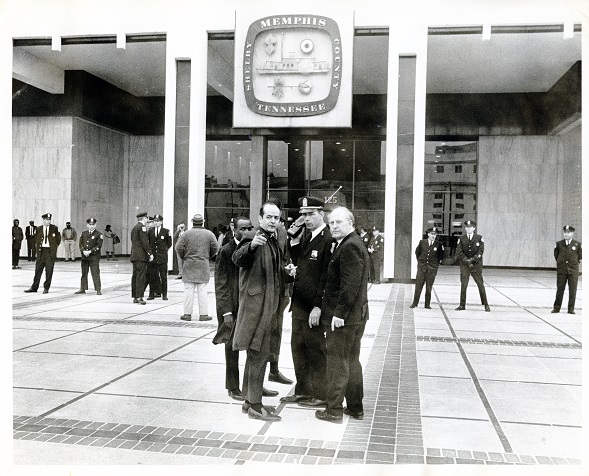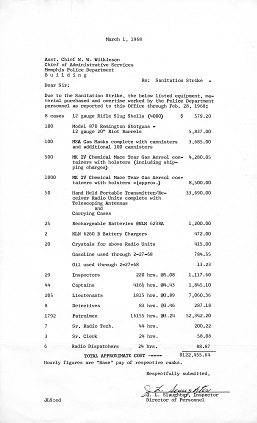
“Rev. Blackburn in front of City Hall.”Special Collections Dept., University Libraries, University of Memphis.
March 16, 1968
There is no doubt the sanitation strike has taken its toll on the city and its residents. Memphians have had to adapt to reduced sanitation services and strikers have had to depend on donations while the strike is ongoing. A side effect of the strike — or perhaps an underlying cause of it — is the racial tension in Memphis. Tasked with maintaining law and order during these turbulent times, the Memphis Police Department (MPD has had to push its personnel to meet the demand created by the strike. Besides placing additional strain on officers in an already stressful job, the department’s overtime amounts will add strain to always tight municipal budgets.
To the department’s credit, steps were immediately taken to meet the anticipated equipment and work force needs resulting from the strike. Captains’ cruisers were ordered to be left at headquarters and days off were eliminated for the uniform division of the MPD effective February 15. By February 23, 8,752 overtime hours had been worked for a total cost of $29,304 for the various inspectors, captains, lieutenants, detectives, patrolmen, sr. clerks, and radio dispatchers. The increased rate of pickets and marches over the last few weeks has only ballooned these numbers.

“MPD List of Equipment Purchased and Overtime Worked”Civil Rights Collection, DIG Memphis.
There have been 55,347 overtime hours worked by 5,762 MPD personnel as of March 15. The bulk of these hours lie with 4,774 patrolmen (37,770 hours) and 641 lieutenants (14,620.5 hours). The total overtime cost is $191,465 [Nearly $1.4 million in 2018 dollars when accounting for inflation]. In addition to the overtime hours, $61,376 was spent on equipment purchases [$445,541 in 2018 dollars]. These purchases include shotguns and shells, gas masks, tear gas, radios, batteries, gasoline, and oil. Because of the sanitation strike and associated pickets and marches, the grand total for the overtime and equipment additions of the MPD as of March 15 is $252,841.51 [$1.83 million in 2018 dollars].
No one wins from an ongoing strike: strikers lack income, citizens receive reduced services, police work mandatory overtime, and budgets become strained. As the strike continues, these symptoms only worsen and lead to a less desirable position for all. It is in everyone’s interest for the strike to end as soon as possible as each day of the strike only increases its overall cost financially and socially. In the case of the MPD, its costs are the city’s costs. And when Memphis pays, all Memphians pay.
Departmental Communication from J. C. Macdonald, February 14, 1968. Series 3, Box 5 “Civil Disorders – Sanitation Strike – 1968 (5)” Folder. Frank Holloman Collection. History Department, Memphis Public Libraries, Memphis, TN.
Departmental Communication from J. L. Slaughter, February 26, 1968. Series 3, Box 5, “Civil Disorders – Sanitation Strike – 1968 (5)” Folder. Frank Holloman Collection. History Department, Memphis Public Libraries, Memphis, TN.
MPD List of Equipment Purchased and Overtime Worked. Civil Rights Collection, DIG Memphis.
Departmental Communication from J. L. Slaughter, March 18, 1968. Series 3, Box 5, “Civil Disorders – Sanitation Strike – 1968 (5)” Folder. Frank Holloman Collection. History Department, Memphis Public Libraries, Memphis, TN.
Departmental Communication from J. L. Slaughter, March 5, 1968. Series 3, Box 5, “Civil Disorders – Sanitation Strike – 1968 (5)” Folder. Frank Holloman Collection. History Department, Memphis Public Libraries, Memphis, TN.
Departmental Communication from W. P. Huston, February 14, 1968. Series 3, Box 5, “Civil Disorders – Sanitation Strike – 1968 (5)” Folder. Frank Holloman Collection. History Department, Memphis Public Libraries, Memphis, TN.
U.S. Bureau of Labor Statistics. “CPI Inflation Calculator.”






